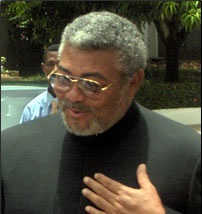
Feature Article by Flight Lieutenant Jerry Rawlings, former president of Ghana.
Before I comment on the G8 summit, first I must condemn the terrorist attack on London and express my deep sympathy for the bereaved families, the wounded and the British people. The atrocity inevitably diverted the attention of participants and public, and it is impossible to know what the G8 would have produced had the shocking events of July 7 not occurred.
We in Africa have been calling for debt cancellation for two decades. Responsible African governments have endeavoured to keep up their debt obligations and have at times been paying out a lot more than they receive. Therefore even selective debt cancellation is welcome.
The debt-relief debate has, however, engendered the false impression - dangerous for Africa's development prospects - that the G8 concession means access to more foreign, and free, funds for national development. The reality is that no funds are coming from external sources. Debt cancellation means the removal of the obligation to transfer financial resources to the creditor. This belief might lead to an unfortunate situation in which governments abdicate responsibility for sustainable economic development, assuming that debt cancellation is a panacea for their country's problems.
As one of the few African leaders to resuscitate a collapsed economy, I would have preferred unconditional debt cancellation for all sub-Saharan Africa, with a monitoring system to ensure that the released funds go into basic infrastructure, health, education and provision of good drinking water - and are not deposited in banks in donor countries. Why should some of the most deprived people continue to suffer just because they have governments that do not qualify for selection? Perhaps these people, if they had the basic needs of life, would have the strength to gain justice from their governments.
Indeed, it might even be the case that a few of those beneficiary governments would welcome debt relief as a way to replenish funds and entrench their power, violating their citizens' human rights and corrupting the moral fibre of society. Paradoxically, debt relief based on perceived good governance could inflict worse governance practices.
In Ghana the economy collapsed due to mismanagement and tyrannical rule. This led in effect to the revolt of 1979, enabling the nation to exorcise some of its anger. But you can't get the best out of people who feel enslaved and exploited; and fortunately, with hard work, we managed to channel the energy of anger into productivity.
Out of that revolt emerged a government under my leadership that was accountable and transparent, and maintained a high level of integrity. We did not empower ourselves at the expense of the people. On the contrary we empowered the people, through political and economic decentralisation.
Working with the World Bank and the IMF, my government halted Ghana's decline; we inherited a near collapsed state and built a 5% growth rate before handing over to the present government. This would not have been possible if I had presided over a corrupt, dictatorial and exploitative government. In other words, true democracy works - you can't go wrong when the people become part of the decision-making process and take equal responsibility for successes and failures.
At the G8 I would also have preferred to see some discussions on fair trade, rather than aid, to create sustainable development. On subsidies the outcome was weak - comforting words, but little real agreement or commitment to substantial action. Meanwhile, in Ghana, for example, textile factories are closing down, the poultry industry is in crisis, and our farmers cannot compete with cheap imports. Thousands are losing productive jobs.
I may appear to have a rather jaundiced view of Gleneagles, but there is cause for hope. Africa's battle to overcome poverty is due to the pressure from African nations and the wave of international support, especially from personalities such as Bob Geldof. These forces have sent a clear signal to the G8 leaders that their own electorates expect them to address global poverty.
At the same time, we in those 24 African countries that will benefit from debt cancellation have a responsibility to ensure that our governments put every single dollar that would otherwise have been consumed by debt repayment to work in the interests of the poorest of the poor: not through selective handouts, but by empowerment, education, and the provision of power and clean water - enabling our people to work and to live in conditions of human dignity and hope.